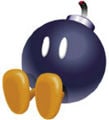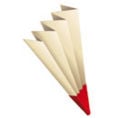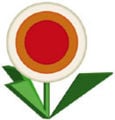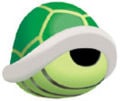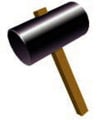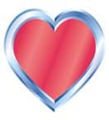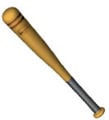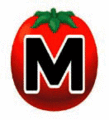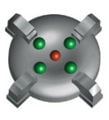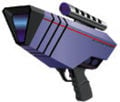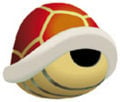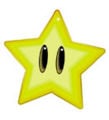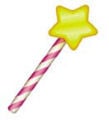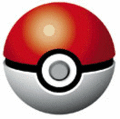Super Smash Bros.: Difference between revisions
| Line 272: | Line 272: | ||
Image:Pokeball.gif|'''[[Poké Ball]] | Image:Pokeball.gif|'''[[Poké Ball]] | ||
</gallery></center> | </gallery></center> | ||
==External links== | |||
*[http://www.smashwiki.com/ SmashWiki - a wiki dedicated to Super Smash Bros.] | |||
{{SSB Games}} | {{SSB Games}} | ||
Revision as of 11:17, February 7, 2008
It has been requested that this article be rewritten and expanded to include more information.
Super Smash Bros. is a fighting game for the Nintendo 64 created by Nintendo and HAL. All the fighters are famous Nintendo characters from the company's various franchises. Players must defeat their opponents multiple times in a fighting frenzy of items, power-ups, an original health system, in outrageous Nintendo-themed levels.
Even though Super Smash Bros. is not a part of the Mario franchise, the game is heavily influenced by the Marioverse (more so than any other franchise).
Playable Characters
There are 12 playable characters in Super Smash Bros.
Default Characters
| Name | Series | Description | Special Moves | |
|---|---|---|---|---|
| Mario | Mario series | Mario has average speed and weight, but has very good jumping abilities and very good strength. His Fireballs are bouncy as in most Mario games. | Fireball | |
| Super Jump Punch | ||||
| Mario Tornado | ||||
| Donkey Kong | Donkey Kong series | Donkey Kong is one of the strongest characters, and has a heavy weight. When he picks up a character, he can carry them for a short distance. | Giant Punch | |
| Spinning Kong | ||||
| Hand Slap | ||||
| Link | Legend of Zelda series | Link is a character with medium weight, strength and speed. He uses his sword to attack. | Boomerang | |
| Spin Attack | ||||
| Bomb | ||||
| Samus Aran | Metroid series | Samus is a slow and heavy character with powerful attacks. Her Grappling Beam allows her to grab characters from farther away. | Charge Shot | |
| Screw Attack | ||||
| Bomb | ||||
| Yoshi | Yoshi series | Yoshi is a fast and heavy fighter with strong smash attacks. Unlike other fighters, Yoshi's shield is not an energy bubble but a green-spotted Yoshi Egg. He does not have a third jump. | Egg Lay | |
| Egg Throw | ||||
| Yoshi Bomb | ||||
| Kirby | Kirby series | Kirby is a light, fast and weak character. He can multi-jump in the air. His special Swallow move allows him to copy other characters' abilities. | Swallow | |
| Final Cutter | ||||
| Stone | ||||
| Fox McCloud | Star Fox series | Fox is a fast and light character with average strength. His Blaster has the unique ability to do damage to an enemy without stopping them. | Blaster | |
| Fire Fox | ||||
| Reflector | ||||
| Pikachu | Pokémon series | Pikachu is fast and light. It uses its electric attacks to damage other enemies. | Thunder Jolt | |
| Quick Attack | ||||
| Thunder |
Unlockable Characters
| Name | Series | Description | Special Moves | |
|---|---|---|---|---|
| Luigi | Mario series | Luigi is a character with average weight and speed but with above average strength. He has many similarities to Mario in his move set. Despite jumping slower than Mario, he does have the highest triple jump of all. | Fireball | |
| Super Jump Punch | ||||
| Luigi Cyclone | ||||
| Jigglypuff | Pokémon series | Jigglypuff is weak and light. It has the ability to multi-jump in the air. | Pound | |
| Sing | ||||
| Rest | ||||
| Ness | Earthbound series | Ness is a fast and light character. In his Smash Attacks, he uses a homerun bat and a yo-yo. For his recovery move, he has to shoot himself into his rear end to catapult himself upwards. | PK Fire | |
| PK Thunder | ||||
| PSI Magnet | ||||
| Captain Falcon | F-Zero series | Captain Falcon is the fastest character in the game. However, he lacks jumping abilities. His attacks are strong. | Falcon Punch | |
| Falcon Dive | ||||
| Falcon Kick |
Arenas
- Peach's Castle
- Yoshi's Island
- Kongo Jungle
- Sector Z
- Dream Land
- Hyrule Castle
- Planet Zebes
- Saffron City
- Mushroom Kingdom (unlockable)
Items
Several items in the game are Mario-based. These include:
Items not from the Marioverse are:
- Beam Sword
- Home-Run Bat
- Motion-Sensor Bomb
- Bumper
- Paper Fan
- Pokéball
- Star Rod (from the Kirby series)
- Maxim Tomato
- Heart Container
Gameplay
Players can use their characters' attacks or items to hit their opponents. This will cause a percentage of damage. The higher the percentage of a player is, the easier he can be kicked off the stage. Percentage of damage can, however, exceed 100%.
There are two different fighting modes in Super Smash Bros., time and stock.
Time
Players get a point when KOing another player. They lose a point when dying. When the time is up, the player with the most points wins.
Stock
Players have a specified amount of lives. When a player has lost all his lives, he loses. The winner of the match is the last player standing. Optionally, a time limit can be specified. When it runs out, the player with the most lives wins.
If there is a tie in one of the modes, there will be a Sudden Death. The two players tied will have a quick stock battle with one life and both starting with 300% percent damage, which will cause them to die instantly when hit. The winner of the Sudden Death wins the whole battle.
Players can fight alone or in teams.
Modes
Single-Player mode
The single-player mode in Super Smash Bros. follows a set pattern. In the beginning, the player can choose his character, difficulty level (very easy - easy - normal - hard - very hard) and number of lives (1 - 5). The number of lives selected will be for the whole mode, not per match.
All stages work with the stock system, and the opponents have one life each. There is a time limit of 5 minutes per match.
- Stage 1: The player fights Link in Hyrule Castle.
- Stage 2: The player fights a team of 18 Yoshis in Yoshi's Island. The player fights three Yoshis at a time. When one is defeated, another one will take its place, until all are defeated.
- Stage 3: The player fights Fox in Sector Z.
- Bonus Stage 1: Break the targets: The player has to hit the 10 targets within a time limit of 2 minutes. Each character has a different arena for his target test. Dying in the target test only causes the failure of the test, but not the loss of a life.
- Stage 4: The player fights Mario and Luigi on Peach's Castle. He also gets a randomly chosen ally for his team.
- Stage 5: The player fights Pikachu in Saffron City.
- Stage 6: The player fights Giant Donkey Kong in Kongo Jungle. The player gets two randomly chosen allies on his side.
- Bonus Stage 2: Board the platforms: The player has to board all of the 10 platforms in the stage within 2 minutes. As with the first bonus stage, failing does not cause loss of life.
- Stage 7: The player fights a team of 8 Kirbys in Dream Land. Seven of them already have abilities from the other 7 default characters. The player fights two at a time.
- Stage 8: The player fights Samus on Planet Zebes.
- Stage 9: The player fights Metal Mario on a stage specially designed for Metal Mario.
- Bonus Stage 3: Race to the finish: The player has to reach the finish within one minute. On his way, Fighting Polygons will attack him or her. Once again, failing does not cause loss of life.
- Stage 10: The player fights a team of 30 Fighting Polygons on the Battlefield stage. He fights three at a time.
- Stage 11: The player fights against the Master Hand. Unlike the player, the Master Hand does not have a percentage of damage, but 300 hit points. The battle is on Final Destination.
Training mode
In this special mode, the player can practice his skills with an opponent with the difficulty of his choice, but no rules such as time or stock.
Bonus practice
Here the player can practice for Bonus Stage 1 and Bonus Stage 2 of the single-player mode.
VS mode
In this mode, up to four players can fight against each other. They can select their characters, teams, optional CPU enemies with a level from 1 to 9, the time or the number of lives, and the stage for the battle.
The same character can be selected multiple times, each time coming in a different color or outfit.
It is also possible for the players to select the items they want to play with.
Official Artwork Gallery
Item Gallery
External links
| Nintendo 64 games | ||
|---|---|---|
| Super Mario franchise | Super Mario 64 (1996) • Mario Kart 64 (1996) • Mario no Photopi (1998) • Mario Party (1998) • Mario Golf (1999) • Mario Artist: Paint Studio* (1999) • Mario Party 2 (1999) • Mario Artist: Talent Studio* (2000) • Mario Artist: Communication Kit* (2000) • Mario Tennis (2000) • Paper Mario (2000) • Mario Artist: Polygon Studio* (2000) • Mario Party 3 (2000) • Dr. Mario 64 (2001) | |
| Donkey Kong franchise | Diddy Kong Racing (1997) • Donkey Kong 64 (1999) | |
| Yoshi franchise | Yoshi's Story (1997) | |
| Crossovers | Super Smash Bros. (1999) | |




